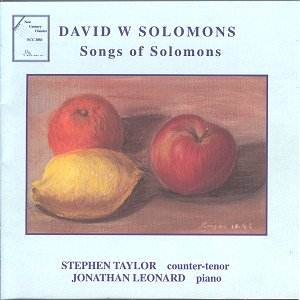 Composer: David Solomons
Composer: David Solomons
Works: Songs of Solomons
Performers: Stephen Taylor (counter-tenor), Jonathan Leonard (piano)
Recording: Da Capo Music Ltd, NCC2003
Label: Da Capo Music Ltd
David Solomons, born in 1953, emerges as a significant voice in contemporary classical music, drawing from a broad palette of influences and idioms. His “Songs of Solomons,” presented here in a collection of ten pieces, showcases not only his lyrical gifts but also his ability to weave narrative and emotion through music. This recording offers a compelling glimpse into Solomons’ oeuvre, reflecting his self-taught background and eclectic style that blends modal harmonies with a modern sensibility. The works range widely in theme, from playful parodies to profound contemplations of love and sorrow.
The performance, featuring counter-tenor Stephen Taylor and pianist Jonathan Leonard, is marked by a keen sense of collaboration that enhances the songs’ emotional depth. Taylor’s counter-tenor voice, with its unique timbre, brings a distinctive character to each piece, particularly in the love songs such as “Dawn in the Room” and “The Quiet Way.” His articulation is clear and expressive, allowing the nuanced lyrics to resonate with poignancy. In “The Swallows,” the evocative piano accompaniment, which mirrors the lyrical content inspired by the Armenian troubles of 1915, is beautifully rendered by Leonard, creating a haunting atmosphere that lingers long after the final note.
The recording quality is commendable, with a slight caveat regarding an initial “plumminess” in the piano tone that quickly resolves into a more balanced sound. The engineering captures the intimate interplay between voice and piano, allowing for a rich sonic experience. The choice of repertoire is particularly interesting, as Solomons includes both his own lyrics and those inspired by works of others, such as Baudelaire. The setting of “Invocation to the Journey,” though it shares a lineage with Duparc’s setting, reveals Solomons’ fresh perspective; the rocking motion of the canal boat is realized sonically in a manner that evokes a vivid imagery of both journey and introspection.
The parodic pieces, such as “Ludhe Sing Tishu,” which humorously nods to the seasonal woes of hay fever sufferers, demonstrate Solomons’ wit and versatility, while “Lookin’ Just Lookin’,” inspired by “lonely hearts” ads, adds a cabaret flair that contrasts sharply with the more serious love songs. This eclecticism not only showcases Solomons’ range but also invites listeners to engage with a variety of emotional landscapes.
This album is a notable addition to the contemporary classical canon, embodying a refreshing blend of humor, pathos, and lyrical beauty. Solomons’ songs merit greater recognition, and this recording significantly contributes to their accessibility. The interplay between Taylor’s expressive singing and Leonard’s sensitive accompaniment creates a compelling case for revisiting these works. Overall, “Songs of Solomons” stands out as an engaging exploration of modern vocal music, affirming David Solomons’ place within the contemporary landscape.



